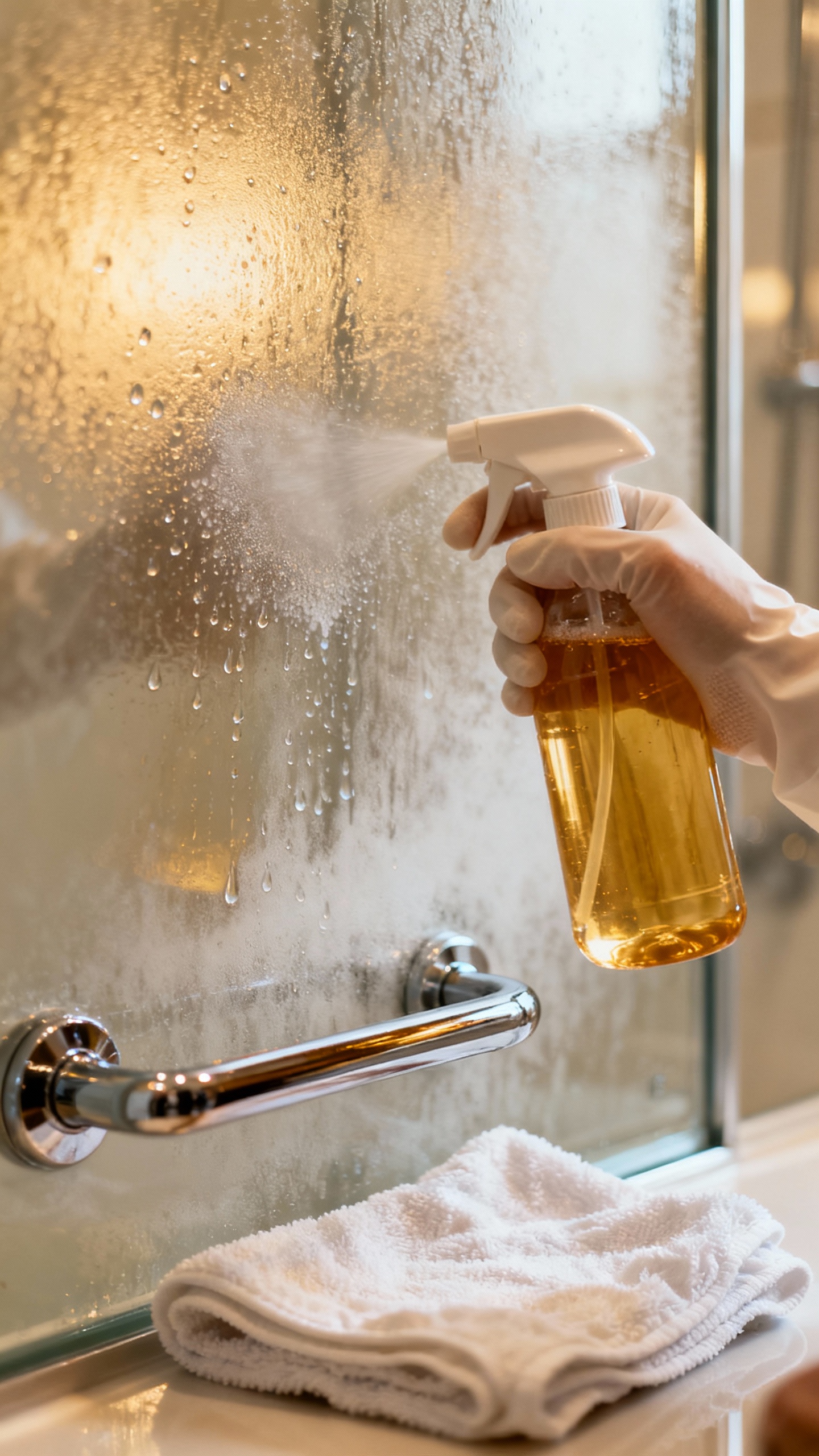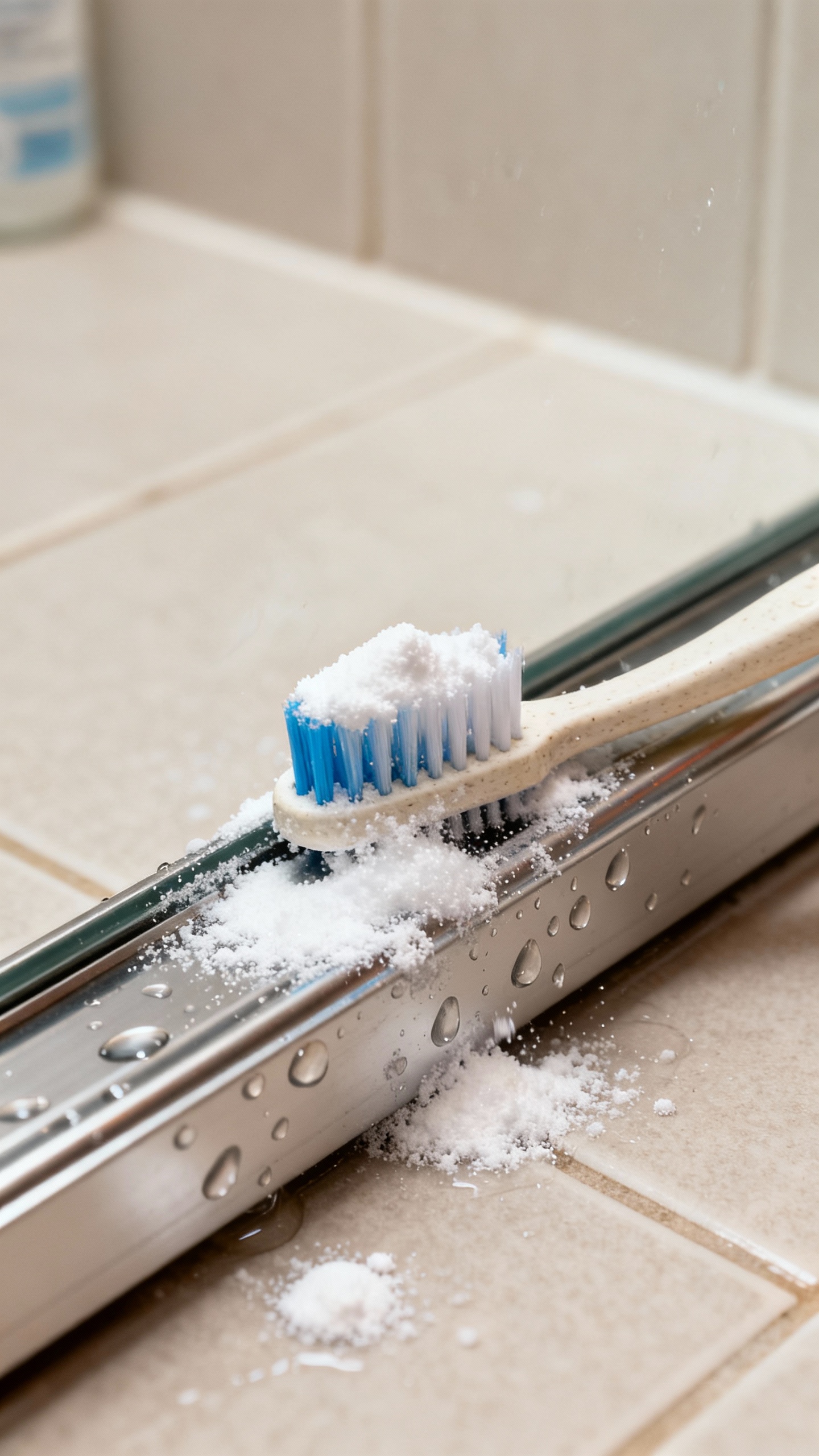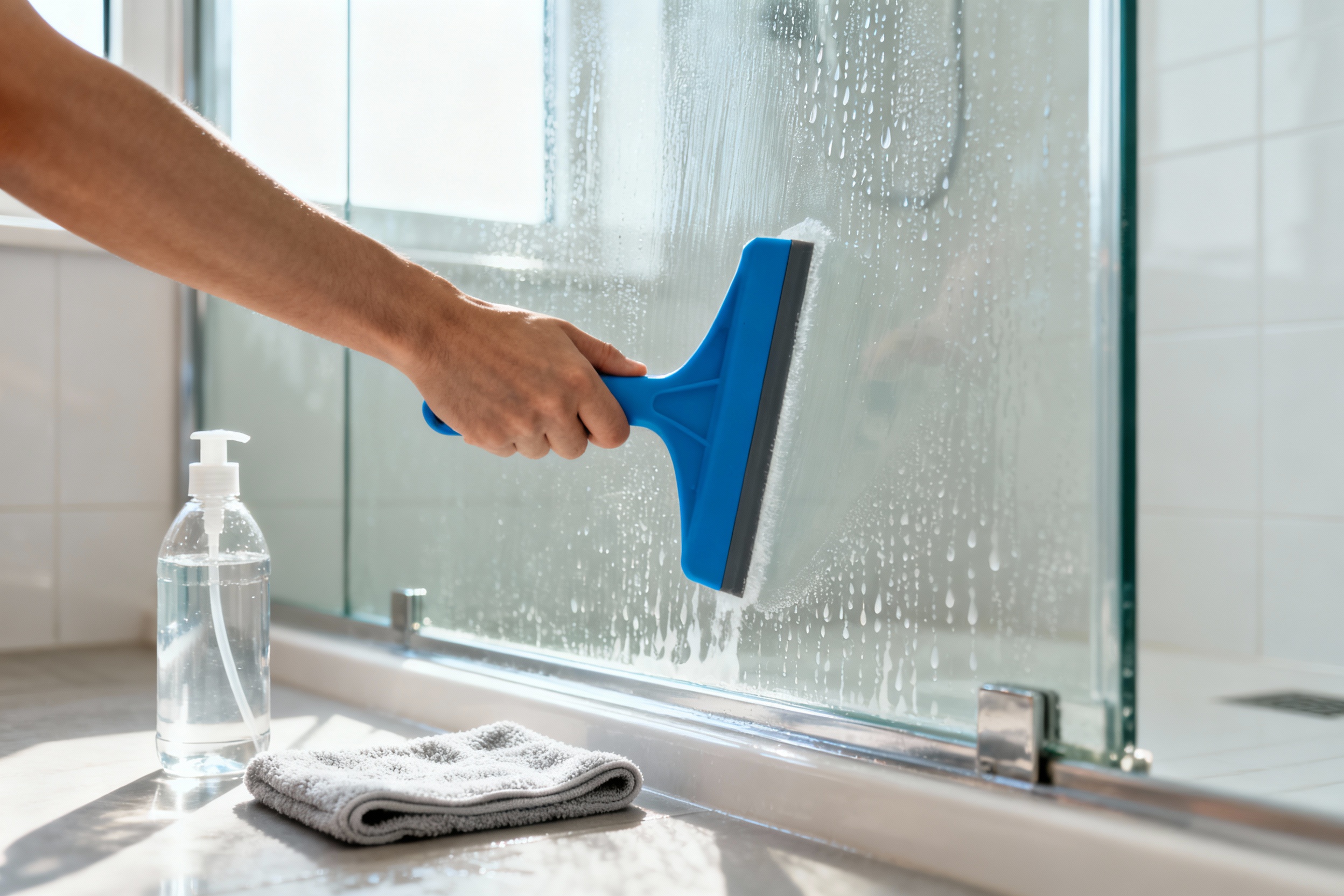Soap scum and hard water spots can turn your glass shower door into a foggy nightmare. The good news? You don’t need magic—just the right routine and a few supplies you probably already own.
In under an hour (with some soaking time), you can get that glass gleaming like it just left the showroom. Ready to kick grime to the curb?
Know Your Enemy: Soap Scum vs. Hard Water

Soap scum looks like a cloudy film that smears when you wipe it.
Hard water stains look like spots or crusty mineral buildup. Why care? Because different villains need slightly different heroes. Soap scum hates acidic cleaners like vinegar and lemon. Hard water needs acid plus a little abrasion.
If you don’t know which one you’re fighting, assume both and treat accordingly. Worst case, you end up with extra-clean glass. Tragic.
Gather Your Supplies (Nothing Fancy)
You don’t need a cart of chemicals.
Grab:
- White vinegar (warm it for extra power)
- Baking soda
- Dawn or another dish soap (the grease-cutting kind)
- Spray bottle
- Microfiber cloths (2-3)
- Squeegee (non-negotiable for maintenance)
- Magic eraser or non-scratch sponge
- Rubber gloves (protect those hands)
- Optional: Bar Keepers Friend, lemon, rubbing alcohol
FYI: Avoid anything labeled “abrasive” unless it explicitly says safe for glass. Scratches = sadness.

The Fast Clean: When You Want Shine Now
This is the no-fuss method. Perfect for weekly maintenance or light grime.
- Warm the glass by running the shower hot for a minute.
Warm surfaces clean easier. Science!
- Mix your cleaner: 1 cup warm vinegar + 1 teaspoon dish soap in a spray bottle. Swirl gently.
- Saturate the door: Spray it like you mean it.
Top to bottom. Let it sit 5-10 minutes.
- Wipe with a microfiber or non-scratch sponge in circular motions. Target the corners and edges.
- Rinse well with warm water.
Don’t leave soapy residue—it dulls the shine.
- Dry and polish: Squeegee from top down, then buff with a dry microfiber. Done.
Pro Tip: Add Alcohol for Streak-Free Shine
If streaks drive you bananas, finish with a quick wipe of 50/50 water and rubbing alcohol. It evaporates fast and leaves glass sparkly.
The Deep Clean: For Built-Up Gunk and Stubborn Spots
If you’re dealing with months (or years) of neglect, roll up your sleeves.
- Do a vinegar soak: Spray warm vinegar generously and press paper towels onto the door like a face mask.
Spray again to wet the towels. Let sit 15-20 minutes.
- Make a paste: Mix baking soda with a splash of water into a thick paste (think toothpaste).
- Scrub gently: Remove the towels, then apply the paste with a damp sponge or magic eraser. Focus on edges and handles where buildup hides.
- Rinse thoroughly with warm water.
- Polish pass: Spray a little vinegar again to neutralize residue, squeegee, then buff with a microfiber.
When Minerals Laugh at Vinegar
Hard water still winning?
Use Bar Keepers Friend (the soft cleanser) or a dedicated calcium/lime remover. Apply per label, scrub with a non-scratch sponge, rinse fast. IMO, BKF works great but rinse thoroughly so it doesn’t haze.
Don’t Forget the Tracks, Seals, and Hardware
The glass gets all the glory, but the crud hides in the details.
- Door tracks: Sprinkle baking soda, drizzle vinegar to fizz, then scrub with an old toothbrush.
Wipe grime, rinse, and dry.
- Rubber seals/gaskets: Wipe gently with soapy water. Avoid harsh chemicals that can degrade rubber.
- Metal hardware: Use a damp microfiber and a drop of dish soap. Dry immediately to prevent water spots.
- Hinges: Q-tips + vinegar for precision cleaning.
You’ll be weirdly satisfied.
Keep It Shiny: Lazy-Proof Maintenance
You cleaned it. You love it. Now keep it low-maintenance.
- Daily squeegee: 20 seconds after every shower.
This halves your future scrubbing. No joke.
- Weekly quick spray: Vinegar + a drop of dish soap, wipe, rinse, dry. Five minutes tops.
- Ventilate: Run the fan or crack the door to reduce mineral spotting.
- Water softener or filter: If your water is basically liquid rock, consider it.
Your glass (and skin) will thank you.
- Protective coating: Apply a glass sealant or a DIY trick: a tiny bit of Rain-X (shower-safe version) every few weeks to repel water.
Make a No-Excuses Cleaning Caddy
Keep a small basket in the bathroom with vinegar spray, squeegee, microfiber, and a magic eraser. If everything’s within arm’s reach, you’ll actually use it. Wild concept, I know.
Common Mistakes to Skip
- Using abrasive pads that scratch glass and coatings.
- Mixing chemicals (never mix vinegar with bleach—dangerous fumes).
- Skipping the rinse which leaves film and streaks.
- Letting cleaners dry on the glass before you wipe and rinse.
- Forgetting the squeegee—it’s the cheapest insurance you’ll ever buy.
What If Your Door Has a Factory Coating?
Many modern doors have a water-repellent coating.
Great news—but treat it right.
- Check the manual or brand website for approved cleaners.
- Skip harsh abrasives and stick to vinegar, mild soap, and soft cloths.
- Reapply sealant if the brand recommends it. Coatings wear down with use.
FYI: If vinegar voids the coating warranty, use a pH-neutral glass cleaner instead.
FAQ
Can I use straight vinegar every time?
Yes, for most glass doors with no special coating. Vinegar cuts soap scum and minerals well.
If your door has a protective coating, use a mild, pH-neutral cleaner instead to avoid dulling it.
Will lemon juice work instead of vinegar?
It will. Lemon is acidic and smells nicer, IMO. It’s a bit stickier, though, so rinse thoroughly to avoid residue and streaking.
How do I remove etched hard water stains?
If stains etched the glass (feel rough and won’t budge), no household cleaner will “heal” it.
Try a professional mineral remover or polishing compound designed for glass. If etching runs deep, consider professional restoration or replacing the panel.
Is a magic eraser safe on glass?
Used gently, yes. It’s a very fine abrasive, so don’t go ham and avoid coated glass unless the manufacturer says it’s okay.
Always test in a corner first.
What about commercial shower cleaners—worth it?
Some work great and save time. Look for formulas that target calcium/lime and say “safe for glass.” Avoid anything that smells like a chemistry lab explosion. Ventilate well and follow the dwell time.
Why does my door look streaky after cleaning?
Too much soap or not enough rinse usually causes streaks.
Use less product, rinse thoroughly, and finish with a microfiber buff or a water-and-alcohol wipe. Also, hard water can spot as it dries—squeegee immediately.
Conclusion
Shiny glass doors aren’t a luxury—they’re a routine. Hit grime with vinegar and dish soap, upgrade to baking soda or BKF for the tough stuff, then squeegee daily and call it a win.
Do a 10-minute refresh once a week and you’ll keep that “like new” sparkle without breaking a sweat. Your future self, gazing through crystal-clear glass, says thanks.


